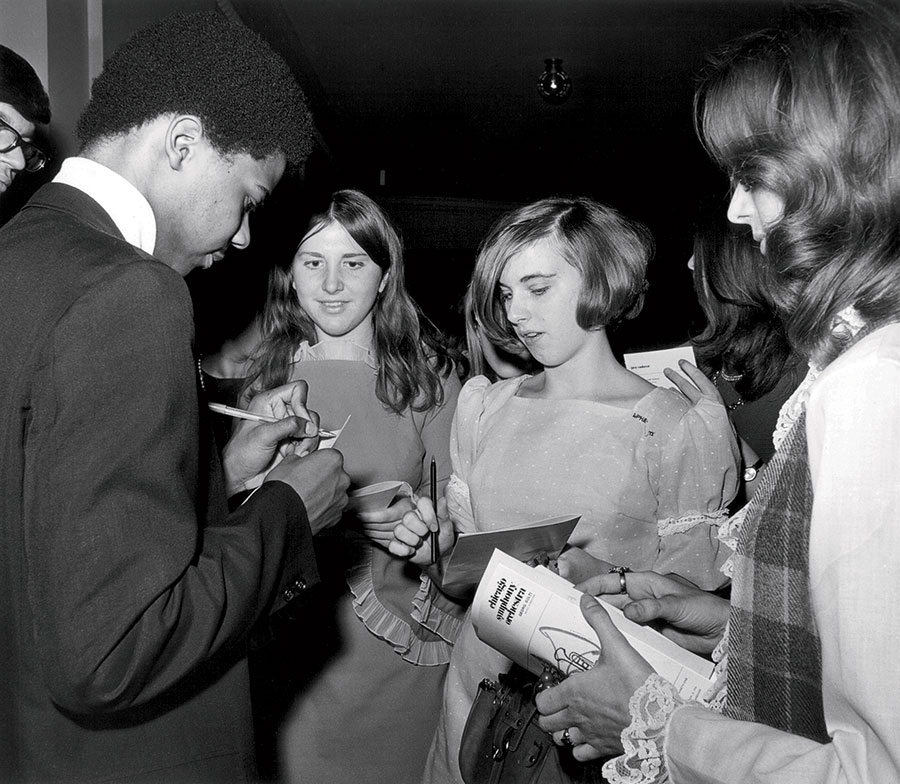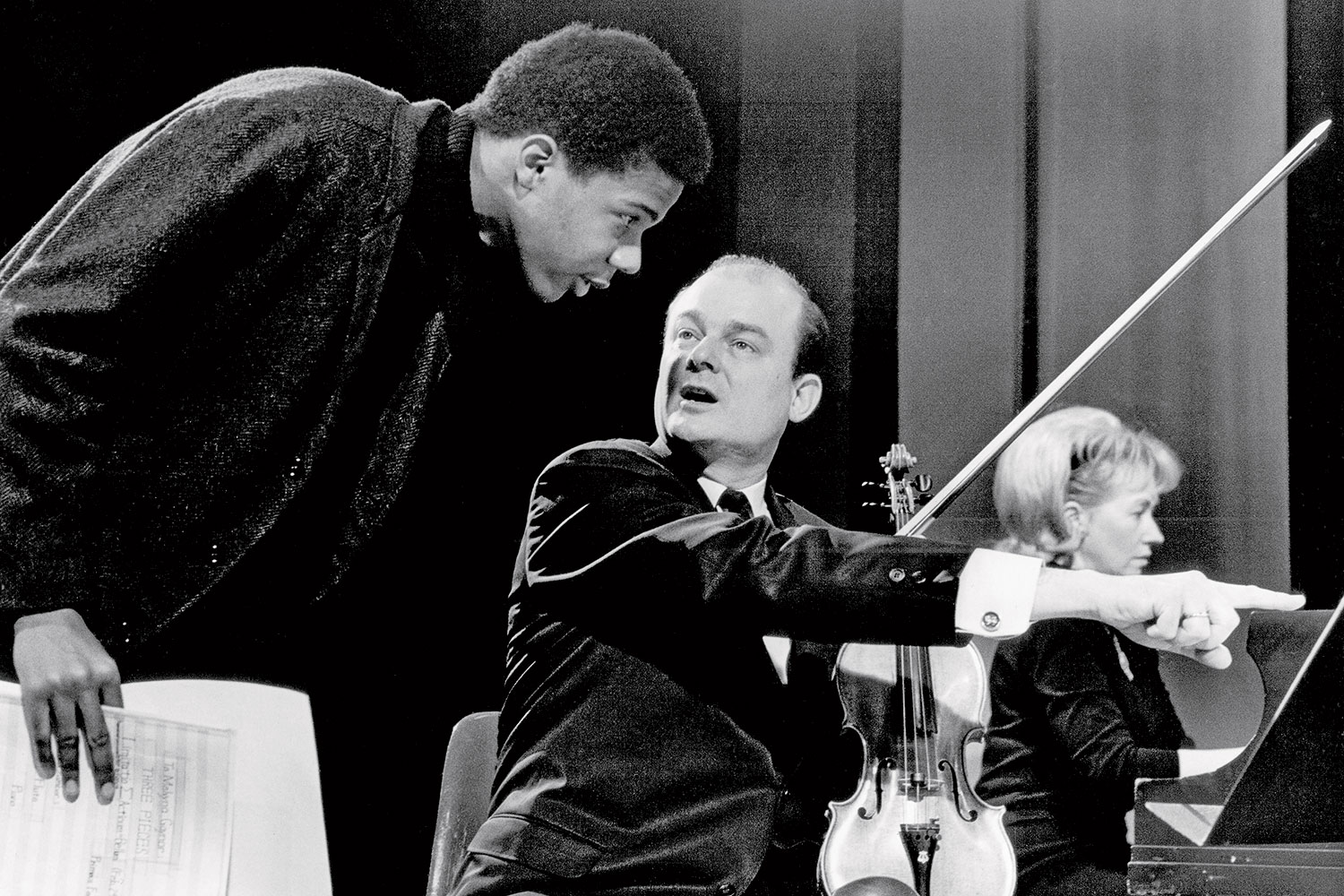What happens to an unheard symphony? To paraphrase the old expression, does it make a sound? Or does it percolate in purgatory, never leaving the mind of its creator?
That question used to keep me up at night. Through my teens and early 20s, classical music was my consuming passion: I’d pipe symphonies through my earbuds until the sun knocked at my window. But sometime after I graduated from college and started writing about music, that passion faded and soured. I didn’t initially have the words for it, but fundamentally, I felt I’d devoted my life to a patrician art form entrenched in exclusivity.
Then, last year, in Chicago Review, I read about a composer named Primous Fountain III. Raised in the now-demolished Ida B. Wells Homes in Bronzeville and completely self-taught, he’d had his music performed by the Chicago Symphony Orchestra in 1970, when he was only 20.
For Fountain, the decade that followed practically read like a who’s who of twentieth-century music. Gunther Schuller and Michael Tilson Thomas conducted his works. Hans Werner Henze invited him to his Italian villa. Miles Davis once ushered him into an exclusive Boston bar with a raspy, cigarette-fried “He’s with me.” Arthur Mitchell choreographed a ballet to his music, and Quincy Jones, an early patron and mentor, commissioned a symphony from him. At 24, Fountain became the youngest composer in history to win a Guggenheim Fellowship; three years later, he won it again.
Not long after that, press coverage of him seems to have all but ceased. I found just a handful of recordings and a smattering of old articles, but no information about where he currently lived. Fountain did have a Facebook page and a website, which indicated that he was still composing, his music championed in the former Eastern Bloc, in places like Moldova, Hungary, and Ukraine. Judging by the few recordings available online, his aesthetic breadth was remarkable, encompassing thorny, Stravinsky-inflected modernism, neo-baroque suites, and monumental, incantatory symphonies that sounded, to my ears, like no other composer’s.
And yet, his music hadn’t been played in the United States for decades. Of the seven feature-film-length symphonies he’d composed, just four had been performed in their entirety, and of them, only one in the United States.
Video: Primous Fountain Committee / YouTube
What was even more astonishing than Fountain’s inexplicable descent into obscurity was his bold plan to remedy it: At the age of 70, he was organizing a world tour. According to his website, he already had his musicians — the National Symphony Orchestra of Teleradio-Moldova — and a proposed itinerary of performances at venues like Carnegie Hall and Chicago’s Auditorium Theatre. I’d never heard of a composer doing such a thing. It sounded ambitious, even quixotic.
Through a music blogger, I was able to get an email address. Fountain replied to my message several days later, and after a few questions about my classical music bona fides, he agreed to talk. He called me from a private number, and when I asked where he was, he said only that he was a bus ride away. He did disclose that he’s lived in South Chicago off and on the past several decades.
Fountain told me that in recent years his own hometown orchestra had snubbed a number of his scores. The way he recounts it, in 2012 a member of the Chicago Symphony Orchestra’s artistic committee pushed for the musicians to play the symphony he had begun writing for Quincy Jones in the 1980s and completed in 2007. The score made its way to music director Riccardo Muti, but the conductor requested more recent work that demonstrated “later development.” Fountain submitted his Fifth Symphony, completed in 2011, but never heard back. (A publicist at the CSO couldn’t confirm Fountain’s account but said it’s plausible enough: It’s not unusual to receive no response even on solicited submissions.)
“Can you imagine?” Fountain said, his voice cracking with indignation. “The Chicago Symphony Orchestra not playing a symphony dedicated to Quincy Jones, by me, a Chicagoan?”
He said he hasn’t had any luck with the Los Angeles Philharmonic, either. “You just think, Do they dislike my music so much that they won’t acknowledge the producer of Michael Jackson’s records? Of the most sold album in history?”

Photo: Courtesy of Chicago Symphony Orchestra
Throughout our conversations, Fountain was candid, irreverent, and unsparing in his criticism of institutions he felt had wronged him. He relays memories of those slights with a restive, cyclical urgency, as though making up for stolen time. One of his favorite stories was of a conductor who told him off during a rehearsal of his Fourth Symphony. Fountain’s offense? He’d stood at the podium and conducted the orchestra at his own tempo, maestro be damned.
Fountain taught himself to compose in his teens by checking out scores and records from the library, taping together piano staff paper to create ad hoc orchestral scores. At Wendell Phillips Academy High School, he started out on the trumpet before moving on to the string bass and then, after his parents bought an upright, the piano. Every night, he’d tiptoe down the stairs from his bedroom and quietly plink out chords while everyone else was sleeping. Years later, he learned that his mother had heard everything. She simply put in earplugs and let him keep playing.
Then came his headline-grabbing 1970 debut with the CSO. During intermission, Fountain said, he stepped outside the hall to stretch his legs, but when he returned, ushers barred him from reentry. Because he was a guest of honor, he had a seat but no ticket. Apparently, the ushers refused to believe a young Black man was the composer whose piece was being played that night. Rather than listening to his music in a plush box seat, Fountain heard most of it from the lobby, as though underwater.
The episode could be a metaphor for Fountain’s career: Doors opened for him early on, then slammed in his face. When Quincy Jones commissioned his Second Symphony, Fountain was sidelined by formidable writer’s block. Eventually, jilted impresarios stopped calling, and Fountain all but withdrew from the classical music industry, if not from classical music itself. He insisted on self-publishing his scores, and he still doesn’t sell recordings of his music. Nor was Fountain particularly interested in following certain conventions of classical music. He was self-taught and determined to stay that way — a provocative position in an art form that prizes pedagogical pedigrees — and chafed against the privilege represented by the concert hall.
“I was lucky Quincy Jones supported me like he did. It allowed me not to become bourgeois.” Fountain chuckled darkly. “But maybe that’s why people don’t want to deal with me now.”
Fountain, I realized, has deliberately positioned himself on classical music’s margins. But he’s also been marginalized. For years, he’s refused any requests to play his music that smack of tokenism, like for Black History Month programs or non–main stage concerts. “I’m not interested in anything that’s only highlighting me as a Black person or filling some kind of quota,” he said. “My work should be put in the regular concert series with all the great composers — your Beethoven, your Mozart, your Stravinsky.”
That’s why the world tour has become Fountain’s white whale: Traveling the globe with his own group of musicians would grant him independence from the American symphony orchestras that have spurned him again and again. “It sends a message,” he said. “I’ve created the work, and I’m not kissing any asses.”
Our final conversation took place over video chat in early June. We’d set a date, then Fountain sent me an email: “Because of the racism (white supremacy) killing of George Floyd, I am cancelling the interview.” We rescheduled for a few days later. The composer appeared on my screen, looking trim and sporting a close-cropped salt-and-pepper beard. He had set up a black curtain behind him as a backdrop.
He talked about his Eighth Symphony, which he'd recently finished, then the conversation turned to his tour. Fountain told me he’d hired an agent to focus full time on raising money and has contacted nearly a hundred celebrities to sponsor it, including Beyoncé and Jay-Z, Oprah Winfrey, Bill Gates, and Michelle Obama. He hasn’t received a response from any of them. He said he’s considering taking out a second mortgage on his house as a “seed fund”: “I mean, I don’t have anything to lose.”
Sirens screamed outside our respective windows — the protests sparked by Floyd’s death were still raging. Hearing the sound, Fountain smiled. “But now, at least, I see I have not wasted my time by composing. You could put my symphonies over footage of what’s happening, and they would tell you about the heartbeat of the people marching, of the clashes with the police, of the suffering and hope.”
Maybe, America is finally ready to hear him again.



